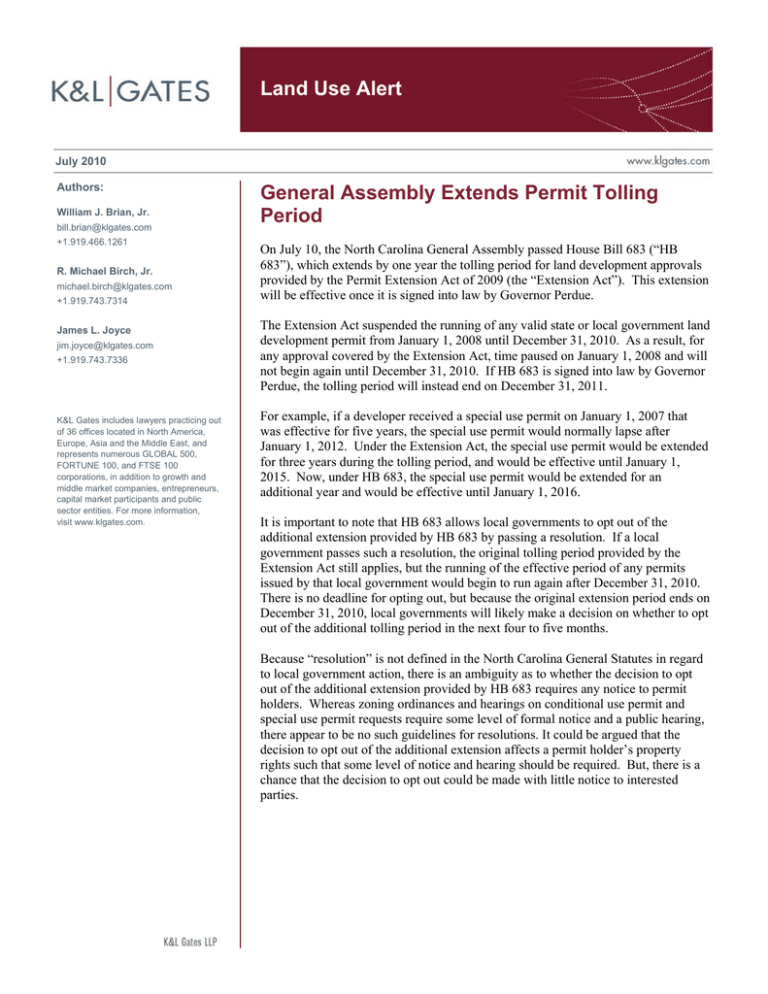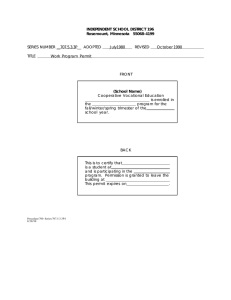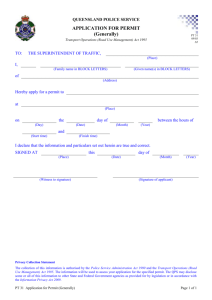
Land Use Alert
July 2010
Authors:
William J. Brian, Jr.
bill.brian@klgates.com
+1.919.466.1261
R. Michael Birch, Jr.
michael.birch@klgates.com
+1.919.743.7314
James L. Joyce
jim.joyce@klgates.com
+1.919.743.7336
K&L Gates includes lawyers practicing out
of 36 offices located in North America,
Europe, Asia and the Middle East, and
represents numerous GLOBAL 500,
FORTUNE 100, and FTSE 100
corporations, in addition to growth and
middle market companies, entrepreneurs,
capital market participants and public
sector entities. For more information,
visit www.klgates.com.
General Assembly Extends Permit Tolling
Period
On July 10, the North Carolina General Assembly passed House Bill 683 (“HB
683”), which extends by one year the tolling period for land development approvals
provided by the Permit Extension Act of 2009 (the “Extension Act”). This extension
will be effective once it is signed into law by Governor Perdue.
The Extension Act suspended the running of any valid state or local government land
development permit from January 1, 2008 until December 31, 2010. As a result, for
any approval covered by the Extension Act, time paused on January 1, 2008 and will
not begin again until December 31, 2010. If HB 683 is signed into law by Governor
Perdue, the tolling period will instead end on December 31, 2011.
For example, if a developer received a special use permit on January 1, 2007 that
was effective for five years, the special use permit would normally lapse after
January 1, 2012. Under the Extension Act, the special use permit would be extended
for three years during the tolling period, and would be effective until January 1,
2015. Now, under HB 683, the special use permit would be extended for an
additional year and would be effective until January 1, 2016.
It is important to note that HB 683 allows local governments to opt out of the
additional extension provided by HB 683 by passing a resolution. If a local
government passes such a resolution, the original tolling period provided by the
Extension Act still applies, but the running of the effective period of any permits
issued by that local government would begin to run again after December 31, 2010.
There is no deadline for opting out, but because the original extension period ends on
December 31, 2010, local governments will likely make a decision on whether to opt
out of the additional tolling period in the next four to five months.
Because “resolution” is not defined in the North Carolina General Statutes in regard
to local government action, there is an ambiguity as to whether the decision to opt
out of the additional extension provided by HB 683 requires any notice to permit
holders. Whereas zoning ordinances and hearings on conditional use permit and
special use permit requests require some level of formal notice and a public hearing,
there appear to be no such guidelines for resolutions. It could be argued that the
decision to opt out of the additional extension affects a permit holder’s property
rights such that some level of notice and hearing should be required. But, there is a
chance that the decision to opt out could be made with little notice to interested
parties.
Land Use Alert
Although local governments can opt out of HB 683,
state agencies do not have this option. Therefore,
the running of time on approvals granted by state
agencies will be tolled until December 31, 2011.
Whereas only local governments can opt-out of the
additional extension, HB 683 provides both local
governments and state agencies a mechanism for
terminating the extension of a development approval
provided by the Extension Act and HB 683. In order
to protect against termination of the extension,
permit holders must (1) comply with all applicable
laws and regulations in effect at the time the
development approval was originally issued; (2)
maintain all performance guarantees that are
imposed as a condition of the initial development
approval for the duration of the period the
development approval is extended or until it is
affirmatively released by the governmental entity;
and (3) complete any infrastructure necessary in
order to obtain a certificate of occupancy or other
final permit approval from the governmental entity.
The upshot of HB 683 is that developers and
property owners with valid development permits
issued by state and local agencies will likely have
an additional year to complete their approved
projects. However, because some local
governments may be inclined to opt-out of this
additional extension, permit holders should be alert
for any developments at the city and county level.
Also, permit holders should take precautions to
ensure that they continue to comply with all
applicable regulations and maintaining all
performance guarantees so as to avoid any chance
that the extension may be terminated.
If a permit holder fails to comply with any of the
three conditions noted above, the issuing
governmental entity may terminate the extension of
the development approval. HB 683 does require the
governmental entity to provide written notice of the
termination, including the reason for termination. If
the extension is terminated by a municipality or
county, the termination can be appealed to the Board
of Adjustment. Even though a state agency is
authorized to terminate the extension, HB 683 does
not specify a route for appeal of the state agency’s
decision; although, such a decision may be
appealable through a contested case proceeding.
HB 683 also includes language that attempts to
clarify the Extension Act’s impact on contracts
related to land development. The bill explicitly
states that the Extension Act does not “[m]odify any
person’s obligations or impair the rights of any party
under contract, including bond or other similar
undertaking.” The impact of this section is not
entirely clear, but it could be construed to mean that
timing provisions in contracts or performance
guarantees related to land development activity
between developers and governmental entities are
not extended by the Extension Act or HB 683.
July 2010
2
Land Use Alert
Anchorage Austin Beijing Berlin Boston Charlotte Chicago Dallas Dubai Fort Worth Frankfurt Harrisburg Hong Kong London
Los Angeles Miami Moscow Newark New York Orange County Palo Alto Paris Pittsburgh Portland Raleigh Research Triangle Park
San Diego San Francisco Seattle Shanghai Singapore Spokane/Coeur d’Alene Taipei Tokyo Warsaw
Washington, D.C.
K&L Gates includes lawyers practicing out of 36 offices located in North America, Europe, Asia and the Middle East, and represents numerous
GLOBAL 500, FORTUNE 100, and FTSE 100 corporations, in addition to growth and middle market companies, entrepreneurs, capital market
participants and public sector entities. For more information, visit www.klgates.com.
K&L Gates is comprised of multiple affiliated entities: a limited liability partnership with the full name K&L Gates LLP qualified in Delaware and
maintaining offices throughout the United States, in Berlin and Frankfurt, Germany, in Beijing (K&L Gates LLP Beijing Representative Office), in
Dubai, U.A.E., in Shanghai (K&L Gates LLP Shanghai Representative Office), in Tokyo, and in Singapore; a limited liability partnership (also named
K&L Gates LLP) incorporated in England and maintaining offices in London and Paris; a Taiwan general partnership (K&L Gates) maintaining an
office in Taipei; a Hong Kong general partnership (K&L Gates, Solicitors) maintaining an office in Hong Kong; a Polish limited partnership (K&L
Gates Jamka sp. k.) maintaining an office in Warsaw; and a Delaware limited liability company (K&L Gates Holdings, LLC) maintaining an office in
Moscow. K&L Gates maintains appropriate registrations in the jurisdictions in which its offices are located. A list of the partners or members in each
entity is available for inspection at any K&L Gates office.
This publication is for informational purposes and does not contain or convey legal advice. The information herein should not be used or relied upon
in regard to any particular facts or circumstances without first consulting a lawyer.
©2010 K&L Gates LLP. All Rights Reserved.
July 2010
3





